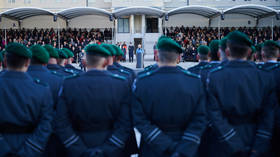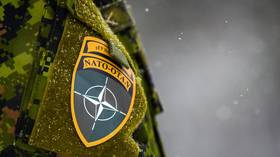German army gets ‘SS’ uniforms

The German Defense Ministry was forced into damage-control mode last week after uniforms bearing the initials ‘SS’ were delivered to thousands of soldiers.
The controversial abbreviation merely stood for the uniform size, identified as ‘S-Short’ by the Bild tabloid, which branded the incident a “mega fail.” Despite the innocent meaning of the SS on the uniforms, the letters were still a no-go for the German Armed Forces, given the strong association with the infamous Nazi “Schutzstaffel” (Protection Squadron) unit.
A paramilitary wing of the Nazis, the SS grew into a major force responsible for state security surveillance and Nazi terror policies, including running concentration and extermination camps, where millions of people perished. It was declared a criminal organization at the post-war Nuremberg trials.
The soldiers who refused the uniforms were instructed to get rid of the letters themselves. According to Bild, Defense Minister Christine Lambrecht ordered the troops to either completely “cut off” the labels containing the letters, or just to cut out the part with the size designation.
Only “a few hundred soldiers” were affected by the incident, a spokesman for the German Armed Forces – the Bundeswehr – told Berliner Zeitung, adding that some manufacturers had failed to comply with the Bundeswehr requirement to use “S-Short” instead of “SS.”
The minister’s reaction was, however, met with criticism by some MPs, who said Lambrecht should focus on more pressing matters instead of chasing the shadows of the past.
“You have to ask yourself why such incidents only ever happen in the Bundeswehr,” a member of the German Bundestag’s Defense Committee said, calling on the defense minister not to “overdo it” and “finally get down to important tasks, like armaments and modernization.”
According to Bild, the controversial garments were part of a large procurement ordered by the defense ministry, which included 313,000 “combat clothing sets” as well as hundreds of thousands of helmets and sleeping bags, at a cost of € 2.3 billion ($2.41 billion).
The ministry told the The Times newspaper on Monday that it was aware the incident looks "very strange" to the public and that it is still in contact with the manufacturer to "investigate what happened."














